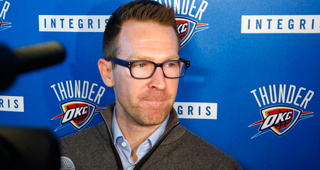A new development in NBA rebuilds has become to bet against the future of a rival team as part of star trades. The Oklahoma City Thunder and New Orleans Pelicans have accomplished this goal in their pick-heavy trades of Anthony Davis, Paul George, Jrue Holiday, Russell Westbrook and Chris Paul.
"What you see OKC doing is how most teams have to do business these days when realistically looking at how to build a team," a rival Western Conference GM said. "Even if there is a superstar available by trade, how many teams can really sit at the disgruntled star table and hope he wants to play there? Five teams? Six maybe.
"This is something that has evolved in recent years as the league has gotten smarter and the stars have taken more power. We have all pushed the boundaries; I'm not sure we can push them much more."
The Boston Celtics' trade with the Brooklyn Nets in 2014 changed the way teams think about trading franchise players as it was an all-encompassing deal with four years of traded first round picks and pick swaps.
League executives tell ESPN that it has become common for there to be days of negotiations over pick protections and swap rights.
"There's a disparity in the access to elite players -- and it's getting wider," one team vice president said. "These deals that are happening now are a function of reality because even when star players come available via trade, they are more and more controlling the trade market. This is not a strategy of strength, it's a strategy of 'no other way.'"
Those pick details are often complicated and are logged at RealGM's Futures Traded Pick page, which has become one of the most impactful documents in the NBA.
Teams are allowed to trade picks up to seven years in advance, but cannot trade first round picks in consecutive years. Pick swaps became a way for teams to extract potential extra value while adhering to the Stepien rule.
"The Lakers aren't worried about trading first-round picks, they just traded a bunch and won a title. The Clippers and Bucks feel they have to do the same to compete," one general manager said.
"We're all just deciding where we are in that market and trying to best position our franchises."


